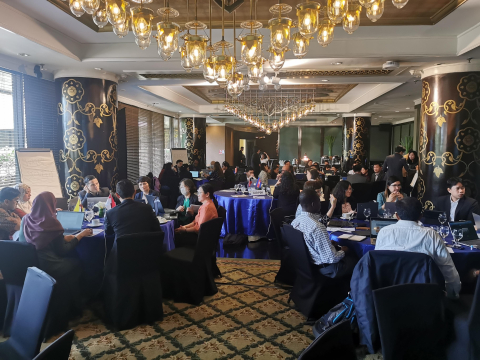CDKN’s knowledge brokering support to UNFCCC’s Needs-Based Finance project recognised in Adaptation Gap report
CDKN’s knowledge brokering support to UNFCCC’s Needs-Based Finance project recognised in Adaptation Gap report
The United Nations Environment Programme (UNEP) released its annual Adaptation Gap Report 2024: Come hell and high water last week, opening with a call for a dramatic increase in adaptation finance. As world leaders gather in Baku for COP29, the need for urgent climate finance is high on the agenda. UNEP’s oft-cited, science-based assessment of global progress on adaptation planning, financing and implementation, reinforced that there continues to be a huge adaptation finance gap. The goal for adaptation finance set by the Glasgow Climate Pact at COP26 was US$38 billion by 2025. Given the need to respond to increasingly severe climate impacts, the estimated gap is currently US$187-359 billion per year.
As early as 2017, in response to a COP23 request from Parties, the UN Climate Change Secretariat established the Needs-Based Finance (NBF) project to assist developing country Parties to assess their climate finance needs and priorities in a country- and regionally-driven manner, and translate these needs into action. The NBF project continues to actively seek to connect global funds to countries and regions, and encourage early engagement so that regional programmes have strong ownership and act to address both national and regional priorities. Specifically, the NBF project focuses on implementing priority mitigation and adaptation measures that developing countries identify and relate to their national adaptation plans and policies.
This year’s Adaptation Gap Report emphasises the need for capacity building to make adaptation efforts across the world more impactful, and includes a spotlight on CDKN’s work co-creating regional climate programmes under the NBF project to access climate finance. CDKN’s Finance Thematic Lead, Ameil Harikishun, designed and led a co-ideation process for NBF training workshops for regional partners and their respective member states. The process aimed to co-create and conceptualise ambitious regional climate finance programmes among regional and national stakeholders that could address challenges identified through the regional NBF project’s technical support.
The training workshops, which were co-hosted by the UNFCCC Secretariat, the major climate change funds, and pertinent regional partners and economic commissions, were co-designed as a peer-to-peer learning process. They considered barriers and challenges to access, and strategised how the different regions could create climate finance pipelines. So far, the trainings have been carried out in eight regions across the world, involving over 50 countries, and resulting in capacity strengthening for more than 150 government officials. As a result, 31 regional climate finance programme ideas have been conceptualised, with an early estimated ambition of accessing US$1-2 billion of climate finance.
The co-ideation process used at these trainings presents an alternative approach to surface agreed-upon regional climate programmes. Based on peer-to-peer learning, the process enables countries to leverage their own experience of accessing climate finance and draws on their stakeholders’ rich technical expertise. The process, first co-developed in 2021, has proven to be an impactful format for engaging across multiple sectors, around both mitigation and adaptation, and will be applied to future trainings and workshops under the NBF project.
Going forwards, CDKN has been asked to support the early development of the second phase of the NBF project, which sets out to enable regional and national capacity to conceptualise and submit robust funding proposals for accessing multilateral climate finance. Having already been involved in trainings in East and West Africa, the East Caribbean, Central Asia and the South Caucasus, and South East Asia, a workshop is planned for 15 member states of the Pacific Islands Forum later this year.
The support provided to countries and regions to mobilise and access climate finance is critical, particularly as we enter COP29 with progress expected on clear outcomes related to the New Collective Quantified Goal (NCQG) and a finance mobilisation target for the Global Goal on Adaptation (GGA).

